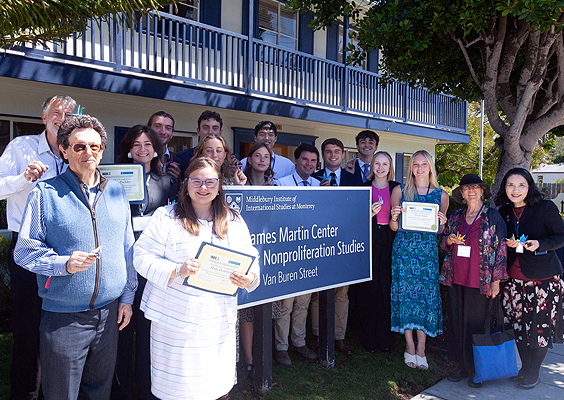August 16, 2024
Masako Toki

Tom and Sarah Pattison, Dr. William Potter, and Masako Toki with 2024 Summer Undergraduate Nonproliferation Fellows
During the summer of 2024, the James Martin Center for Nonproliferation Studies (CNS) at the Middlebury Institute of International Studies at Monterey (MIIS) hosted 12 outstanding Undergraduate Nonproliferation Fellows. One of the highlights of the Undergraduate Fellowship Program is the Fellows’ research presentations at a luncheon event with major supporters of CNS—Sarah and Tom Pattison, CNS experts, and several MIIS faculty members. This year, Tom and Sarah visited CNS to meet with the Undergraduate Fellows on August 6, a date which coincided with the Hiroshima A-Bomb Memorial Day.
Sarah and Tom Pattison have been longtime supporters and friends of CNS and MIIS. They are major supporters of CNS’ nonproliferation education projects for young generations including the Summer Undergraduate Nonproliferation Fellowship and the Critical Issues Forum Project. CNS is extremely grateful to have such dedicated friends who value and understand the importance of nonproliferation and disarmament education for young generations in order to make progress toward achieving the goal of peace and security, and a world free of nuclear weapons.
With a personal commitment to nonproliferation and a more secure and peaceful world for future generations, Tom and Sarah established the Tom and Sarah Pattison Fund over a decade ago in support of the CNS mission. Their generosity bolsters CNS’ activities related to efforts to achieve a WMD-free zone in the Middle East as well as the training of young scholars and experts in the nonproliferation field. Therefore, CNS’ unique Summer Undergraduate Nonproliferation Fellowship Program aligns with the purpose of the Fund.
Presentations
At the luncheon, the 12 Fellows introduced their individual research projects. This year’s group comprised a diverse set of undergraduate students from a variety of backgrounds and specializations.
The Fellows’ research topics included the prospect of U.S.-China arms control, the implications of Chinese-Kazakh joint venture uranium mining companies on Sinophobia in Kazakhstan, nuclear power in Kazakhstan and the role of public opinion, Iranian nuclear development, historical perspectives on US nonproliferation efforts toward Israel and Taiwan between 1958 and 1988, humanitarian perspectives on nuclear testing, recent Houthi attacks in the Red Sea, comparative study of the use of CBRN weapons by non-state actors in Africa, the impact of language on women’s representation in nuclear nonproliferation, the intersection of Artificial Intelligence and small modular reactors, and Russian chemical weapons usage in Ukraine: verifications, explanations and implications.
Check out Fellows’ presentations!
These projects were driven by high-quality research methodologies and innovative studies, resulting in original perspectives and engaging presentations. The Fellows presented their findings, next steps, and future avenues. In response to each presentation, CNS experts gave invaluable comments and feedback to the Fellows. Many of the Fellows will continue to work on their research projects, with a view to getting published.
The luncheon event was a mutually enjoyable event for both Mr. and Mrs. Pattison, the Undergraduate Fellows, and all other participants, as evidenced by their lively and thoughtful discussions. The audience was very impressed with the Undergraduate Fellows’ high-quality research projects, innovative thinking, and analytical skills. In his comments, Dr. William Potter, Founding Director of CNS, reiterated his belief in the importance of nonproliferation education for the next generation to combat proliferation of weapons of mass destruction.
In Their Words
“Accessibility to the faculty and experts was greatly beneficial… and also, you know, saving the world from nuclear annihilation is pretty, pretty, pretty good too.” — Josiah Durfee, Middlebury College
“I worked with some of our Eurasian experts here, having the opportunity to have more nuanced conversations really filled in some of the gaps in my understanding.” — Jessica Sobieski, University of Georgia
“I’ve done several other internship programs, and this has been the best one by far for my future career.” — Holly Dickenson, Smith College
“Getting to use my Russian language skills has been the highlight of the Program… Nonproliferation is a good niche to get into the international relations field.” — Maya Watson, Middlebury College
“You also get to conduct your own research project and then present it at the end.” — Sircey Smith, Trinity Washington University
“Nuclear weapons are scary; I went to Hiroshima in April, and that was a very profound experience, very sobering, and I thought it was cool to see all the people here that are devoted to those issues.” — Berkley Pelletier, American University
Watch short videos of their testimonies!
Special Thanks
All of the Fellows were selected through a rigorous and competitive application process. The Fellowship offers college students a rare opportunity to engage in research on nonproliferation issues. This initiative helps fulfill CNS’ mission to train the next generation of nonproliferation specialists, a mission which has been consistently supported by the Tom and Sarah Pattison Fund.
This year’s summer program is also supported by the Middlebury College Provost Office, and the Carnegie Corporation of New York. We would like to express our deepest appreciation for their support.
